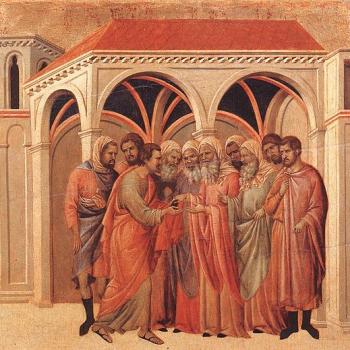Historically, in 735 B.C.E. Aram and Israel invaded Judah in the so-called Syro-Ephraimitic war in an attempt to coerce Ahaz to join them against the Assyrians. Ahaz refused and sent to Assyria, against Isaiah’s warnings, for help. Isaiah counsels Ahaz as follows, using a Hebrew pun: “If you do not stand firm (in faith), you surely will not stand firm” (the two verbs of the sentence are identical). Trust God, says Isaiah, do not trust Assyria or Israel or Aram or Egypt or any other country. Only God is your final fortress.
Thus, the sign of Emmanuel to Ahaz warns him that all foreign alliances are doomed; a tiny nation like Israel is forever fated to be only a pawn in the political designs of far larger and more powerful countries. Nations all rise and fall, but Ahaz, and we, are never to forget that God is always with us.
And there we discover the deeper truths of Isaiah 7 for us Christians. Whenever we rush to attach ourselves to another protector out of fear that we will lose what we so desperately wish to retain -- our way of life, our nation state, our individual safety -- our hopes in these intermittent protectors are forever destined to be dashed. The hope of the birth at Christmas is that God is with us in the midst of our greatest fears. Little wonder that the first word from Luke’s chorus of angels to the awestruck shepherds was “Fear not!” Do not be afraid, for his name is called Emmanuel, and in him God is with us.
Read Alyce McKenzie's accompanying New Testament reflection for this week, “The Fear of Betrayal,” here.





